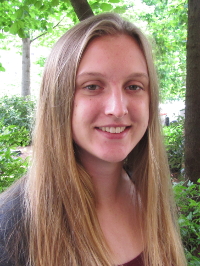2019 NIMBioS-NSA REU Program Participant Profile:
Ellie Lochner
 |
Hometown: Phillips, WI
|
Why did you apply to the SRE program?
I applied to the SRE program because I am interested in learning more about math and its applications to biology and other disciplines. I also wanted to gain research skills that will be valuable in graduate school and form connections with mentors and students from different backgrounds and experiences that are also excited about interdisciplinary research.
![]()
I've learned a lot of new things since this program started. I think one of the most important has been learning to communicate in a small group and divide up the work by people's strengths.
![]()
– Ellie Lochner, SRE participant
What is the purpose of your research?
In our research, we are identifying areas where climate change is reshaping the distribution of wild buzz pollinators in North America. We generate species distribution maps by using known occurrences of the pollinators and future climate models. Since buzz pollinators are critical for pollinating certain plants such as tomatoes, we can identify areas where the loss of pollinators may have a negative impact on agricultural activity, and specifically that of tomato crops.
What does the research ultimately accomplish? What contributions to science and/or humanity does the research ultimately make?
One in every three bites of food we eat is made possible by bees, and wild bees are an important part of this process. When climate change affects the distribution of these wild pollinators, it affects the food we eat every day. Identifying the areas in jeopardy is an important step to start taking actions to preserve wild pollinators and the important services they give us.
Describe a typical day on the job.
Usually I bike to NIMBioS around 9am, grab some coffee in the break room and head to the Spatial Analysis Lab (SAL) to meet my group and start working. Most of our project is focused on dealing with data and making maps, so we spend a lot of our time on our laptops or computers in the SAL lab. We meet with our mentors about twice a week to let them know what we've done and talk about what direction we can go next. Every day is really different though. Some days we have tutorials or graduate school talks in the mornings, and we've also spent a day touring Oak Ridge National Laboratory and a day going to the zoo.
Tell us something about your field of study we would be surprised to know.
Math is everywhere! I think a lot of people think of math as just a subject in school that they never have to come back to after graduating, but math is found in everyday things. From reading a map, to making decisions when shopping, to planning a trip, people really use math all the time.
What were your favorite parts of the SRE program?
My favorite parts have been getting to know the other researchers and mentors. Everyone comes from different backgrounds, but we all share the interest in research and it has been really fun to learn from everyone and make new friends. I also loved our trip to the Smoky Mountains to see the synchronous fireflies!
What new experiences did you gain that have helped you today?
I've learned a lot of new things since this program started. I think one of the most important has been learning to communicate in a small group and divide up the work by people's strengths. I've also learned to record everything when doing research since it is important to know what decisions you've made and why throughout the process.
What advice would you give someone who's interested in/curious about participating in the program?
I would say to apply! Don't worry about not having the right experience or background. Everyone has their own strengths and there are a lot of sessions in the first few weeks to get caught up in certain areas. I would also advise reaching out to mentors or past participants to get a feel for the program and the research, especially if a particular project sounds interesting to you.
Would you recommend our program to others?
Absolutely! This program is a great way to learn about what it's like to conduct interdisciplinary research and make connections and new friends. It's also in a great location, with downtown Knoxville in walking distance from campus and only about an hour drive to the Smoky Mountains.
NIMBioS
1122 Volunteer Blvd., Suite 106
University of Tennessee
Knoxville,
TN 37996-3410
PH: (865) 974-9334
FAX: (865) 974-9461
Contact NIMBioS


